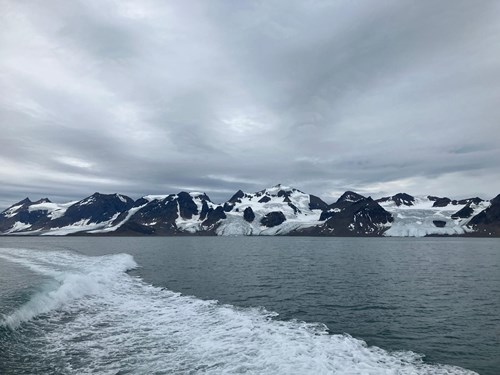"My first two years of university were spent completely online, and many of the services and information that would normally be available to me were out of commission during this period. When entering my third year and finally getting to experience in-person classes, I was elated but also saddened by how much life experience I had surely missed out on due to the pandemic. For a few months I was searching for ways to make my final year as memorable as possible, but, due to budget limitations, I always thought going abroad for school was impossible. This all changed when I had an off-shoot discussion with one of my professors, with him stating that many students have gone to Norway through a North2North program connected to Lakehead University. After some investigation I knew I wanted to have that experience, and being focused on a degree in Animal Sciences, I wanted nothing more than to go to Svalbard, an amazing place for arctic studies.
Svalbard does not have a proper university, but it instead has a research center that provides university courses and scientific opportunities in UNIS (The University Centre in Svalbard). This center is within Longyearbyen, one of the only towns on the entirety of the archipelago, with a population of ~3000 people. The courses I took were terrestrial arctic biology and arctic population ecology, both of which focus on the arctic as a whole and how global climate changes are affecting these rare habitats. I pursued these specific courses due to a large portion of Canada also being within the Arctic Circle, to bring this knowledge back to my homeland and use it to better indigenous communities in the northern provinces. Both of these courses were taught by a main professor; however, most lectures were done using guests flying in from around the world to talk about their Arctic and Antarctic research. They all went in detail as to how the ecosystems in the Arctic function, the interconnectedness they have, and how it all relates to people and our cultures from around the world. It was truly an experience you can gather from no other place, it had an amazing mix of both fieldwork and lecture periods intermingled with the vast changes in daylight and temperature throughout the year.
All courses offered by UNIS are surely worth experiencing, not only are the lecturers knowledgeable about their subjects but they are also great connections to have for future working opportunities. Many of them openly stated they would welcome students from UNIS into many of their projects or even recommend them to their other colleagues. However, the connections made with the other students within your classes are surely to be more important. You spend every day with those people, not only at lectures but also in your housing, when you go shopping, to the gym, to your kitchen, they will be in your life for what feels like forever and then by the end of the class, you separate. The separation is not sad however, because you know you will eventually see them again, you know everything about them now, and as do they with you. Your friends will go and make careers themselves, and I am certain that I could talk to any of them about a job opportunity they may have for me, across the entirety of Europe.
Svalbard is a beautiful place, with a culture unlike any else in the entire world. Everyone who goes there has their own reasons for venturing so far north, and they all have a shared interest in science and discovery. There are so little people that you really get to know and understand your fellow students to a level equivalent to years of friendship in only a span of a few months. The experience is one I will cherish forever, and the people are those who you will never want to forget for as long as you live. Going abroad is for everyone, no matter what amount of funding you have or history in your past. The worst thing you can do is limit yourself without even attempting that which you want in the first place."

